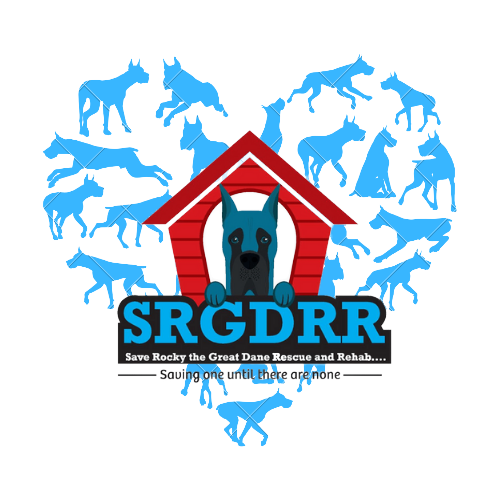FAQs
Basic Information About Great Danes
Great Danes are classified as extra-large dogs, often affectionately called “Gentle Giants.”
Males: typically stand 32"–36" at the shoulder, weighing 140–180 lbs.
Females: generally stand 28"–33", weighing 110–140 lbs.
They usually don’t reach full maturity until about 18–24 months.
Their average lifespan is 8–10 years, though excellent care can help them live longer.
Owning a Great Dane is a major commitment, with costs and responsibilities that far exceed those of smaller breeds.
Great Dane Characteristics
They’re famous for the “Dane lean,” pressing against you to show affection.
Despite their imposing size, they’re often gentle, playful, and incredibly sweet.
They love to play in short bursts and are well known for their zoomies — racing joyfully in circles.
Many will paw at you gently to get attention.
Their stunning spots and beautiful colors only add to their unbeatable personalities.
Quick Tips for Care
Because of their size, everything costs more — from food to vet care and boarding.
Use elevated feeders to reduce strain and help prevent bloat.
Let them rest 1–2 hours after eating, with no active play, to allow proper digestion.
Add glucosamine supplements for joint support.
Use fish oil or coconut oil for a healthy coat and skin.
Choose dog food with 20–24% protein to avoid excess that can cause growth or health issues.
For anxiety, try thunder shirts, diffusing lavender oil, or daily calming with Pawtree CBD Mega, which are especially helpful during storms or stressful changes.
Nutrition
Male Great Danes eat about 7–10 cups of food daily.
Females eat slightly less, about 6–8 cups daily.
Always split their daily amount into two meals to help prevent bloat.
Vetting & Medical Costs
Because they’re giants, Great Danes incur higher costs for nearly everything:
Most medications, heartworm prevention, flea control, and antibiotics are priced by weight.
Surgeries and diagnostics like x-rays also cost significantly more.
Typical veterinary costs for Great Danes include:
$150 for a complete set of vaccinations.
$350–$400 for spay or neuter.
$800–$1,000 for heartworm treatment.
$400–$3,200 for gastropexy (a surgery to prevent deadly bloat).
Routine care, including food, preventatives, and supplies, averages about $150–$250/month per dog, depending on their specific needs.
Boarding & Grooming
Boarding large dogs is almost always more expensive. Expect $50–$80 per night in many areas.
Grooming needs are minimal:
Weekly brushing (daily during heavy shedding).
A bath about once a month.
Wipe paws as needed.
Grooming typically takes about 20 minutes.
Great Dane Health Information
Like many purebreds, Great Danes are prone to specific health conditions. With routine vet care and awareness, many issues can be managed or prevented.
Major Health Concerns
Bloat (gastric torsion):
A life-threatening twisting of the stomach. Signs include a swollen belly, dry retching, drooling, restlessness, and clear discomfort. This is an emergency — immediate vet care is crucial. Gastropexy surgery can prevent bloat in about 99% of cases.Cardiomyopathy:
A heart disease common in older Danes, treated with medication. Watch for reduced exercise tolerance.Osteosarcoma (bone cancer):
Sadly common and often fatal within a year. Signs include limping or a painful lump on a leg.Hypothyroidism:
Often seen in females. Symptoms include weight gain, a dull coat, and flaky skin. Easily managed with daily medication.Wobbler’s Syndrome:
Affects the neck, causing a “wobbly” walk. Surgery is expensive and often limited in effectiveness, though acupuncture or emerging alternative treatments may improve comfort.Von Willebrand’s Disease (VWD):
A rare clotting disorder similar to hemophilia. Managed with lifestyle adjustments and sometimes transfusions.Hip Dysplasia:
Occurs when the hip doesn’t fit properly in the socket, leading to limping or pain. Often managed with medication or surgery.Epilepsy:
Seizures can look frightening. Keep other pets away, avoid their mouth, and stay cautious until your Dane is fully out of the episode. Then their normal personality returns. Always follow up with a vet to determine causes.
Overall
Owning a Great Dane is a joy like no other — but it’s also a serious financial, emotional, and physical commitment. Being prepared ensures you can give your gentle giant the very best life.
With the right care, Great Danes repay you with loyalty, love, and a truly special companionship. They are, without question, gentle giants with hearts of gold.

